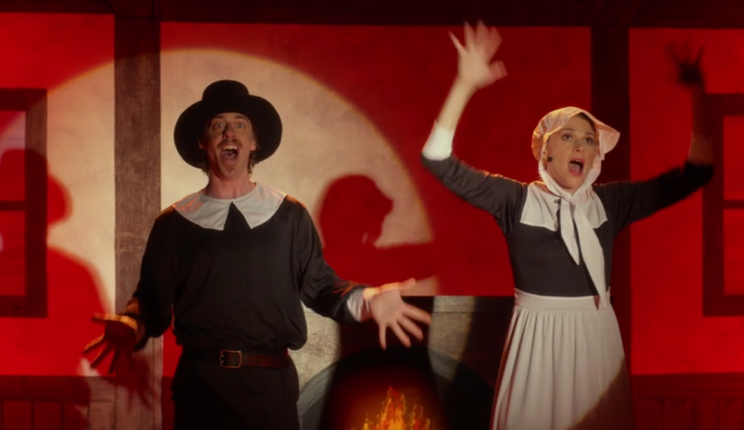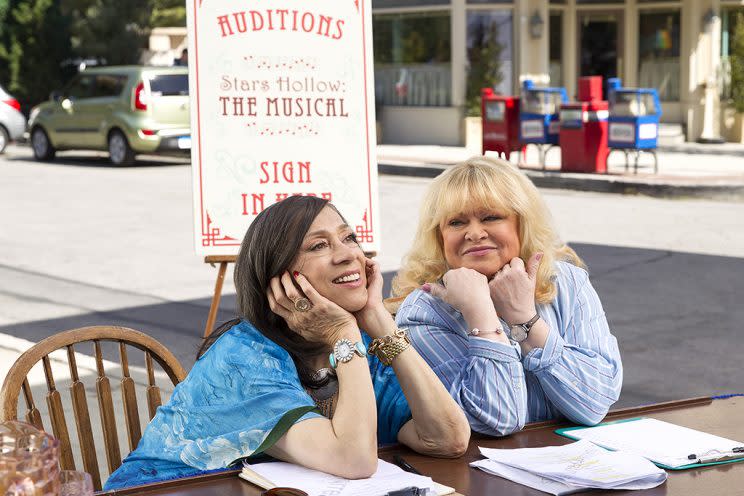‘Gilmore Girls: A Year in the Life’ Review: ‘Summer’ Time and the Livin’ Ain’t Easy

Netflix has posted all four new episodes of Gilmore Girls, collectively known as Gilmore Girls: A Year in the Life. I’ve already written a spoiler-free, overall review of the quartet of Stars Hollow specials here, but now I’m writing one review per day of each individual episode. Yesterday’s review was of “Spring.” Today is a review of the third episode, “Summer.” You are hereby and loudly warned: WALL-TO-WALL SPOILERS OF GILMORE GIRLS: A YEAR IN THE LIFE follow. Grab a mug of coffee and some Hot Pockets.
It is amazing how much can be packed into these 90-minute Gilmore Girls episodes, and this one features a big chunk of a new musical about the history of Stars Hollow, a new job for Rory as a newspaper editor, the return of Rory’s ex-boyfriend Jess (Milo Ventimiglia, wearing his This Is Us mustache), a breakup with Logan, the introduction of the irritating 30-something gang, the announcement of Rory’s next big career move and Lorelai’s next big life change. Oh, and also Michel’s big life move. And yet it’s also perhaps the weakest of the four episodes, relying too heavily on running gags that exhaust themselves too quickly, such as the follow-through on the previous episode’s conclusion: Rory moving back to Stars Hollow. “I’m not back,” she keeps saying defensively when seemingly every person she encounters says, “Welcome back!” or, “I knew she’d come back!”

Two big town events occur. One is Stars Hollow: The Musical, a co-production by Taylor and his morose collaborator, Nat Compton, starring Sutton Foster (star, I probably don’t need to tell you, of Amy Sherman-Palladino’s short-lived but well-loved Bunheads) and Christian Borle, who some TV viewers treasure from that hate-watch-classic on NBC, Smash, which wasn’t. This episode — written and directed by Daniel Palladino — recognizes the polarizing effects of musicals on any given audience and tries to acknowledge both sides. While all around Lorelai are held rapt by the cleverly written numbers performed by Foster and Borle, Lorelai is the holdout who thinks the whole thing is a botch and a bore. I certainly admire the pluck of F and B, but I side with Lorelai. The second time I watched “Summer” and came to the songs, I admit I scanned through most of them. There’s also a running gag about Kinky Boots that gets old super-fast. But can I also just say that the latter-day Sally Struthers, forever bellowing hoarsely as Babette, is a national treasure?

The second biggish event is Rory’s taking over as editor of the Stars Hollow Gazette, which was on the verge of folding. Lots of jokes about the antiquity of print culture; Rory hangs a portrait of the late, great New York Times media columnist David Carr on the wall; and Jess returns to chat and give her the idea for…
…THE BOOK. It is a project worthy of capitalization. It will be Rory’s version of her relationship with her mother. A memoir. (I know this is sacrilege, but I disagree with Lorelai’s “note”: I’ve always thought the show title should be The Gilmore Girls. Dropping the definite article implies a bunch of Gilmore females, and only Emily could possibly be added as the show was originally conceived.) At this time in Rory’s life, when the frustrated writer is at a crossroads in her career, Jess’s suggestion of a memoir is far better than any advice she received from the real/not-real Jim Nelson at GQ in the last episode. Lorelai, predictably, is not in favor of this. She withholds her permission. They quarrel; it’s a very good, heart-rending quarrel. Yet why is this delightfully predictable? Because in crucial moments like this, Lorelai reveals the traits she shares with the person she wants least to resemble: her mother.
Speaking of Emily, she’s now sleeping till noon, is bored by her Daughters of the American Revolution meetings, and is allowing herself to be sweet-talked by Ray Wise’s not-Twin Peaks character.
The episode climaxes with the revelation that in the months that have passed since spring, Luke has not told Lorelai about looking at franchise properties, while Lorelai has never told Luke that she’s continued to have solo therapy sessions after Emily gave up on Claudia (who turns out to be a closet theater geek). I should add that the scene in which Luke has to cook burgers for one day for the guests in the mere 10 rooms of the Dragonfly Inn clearly proves he cannot possibly become a franchise owner. More seriously, this withholding-information notion drives a wedge between Lorelai and Luke and spurs Lorelai to announce that the book she’s been reading, Cheryl Strayed’s Wild, has inspired her next adventure, which will conclude A Year in the Life.
Overall, “Summer” repeats the themes of betrayal and insecurity for all three core Gilmore women while providing some warm laughs and entirely too many flat, repetitious jokes.
Related: ‘Gilmore Girls’: A Journey Through Lorelai’s Love Life
Extra Gilmore Gifts:
Luke’s daughter April returns only to reestablish why she was a dull character: She’s so aware of her dullness, she admits she recently “bought a joke book.” No one has bought a joke book since the heyday of Joey Adams. I know, I know: that’s the joke. Still ain’t funny.
Allusions, especially wide-ranging this time, are made to Game of Thrones, Noam Chomsky, Kanye West, Paul Thomas Anderson, Dave Eggers, Michael Bay, and Perry White.
Michel breaks the news that he’s leaving the Dragonfly Inn to take a job at a Manhattan W Hotel. He does this over drinks with Lorelai at the Secret Bar, a running gag that gets old super-duper-fast.
My wife wonders whether Jess giving Rory the idea for THE BOOK is a nod to the Anne of Green Gables books, specifically when Gilbert tells Anne she should write about what she knows best: life in Avonlea, a rural place only slightly less idyllic than Stars Hollow.
Gilmore Girls: A Year in the Life is now streaming on Netflix.

